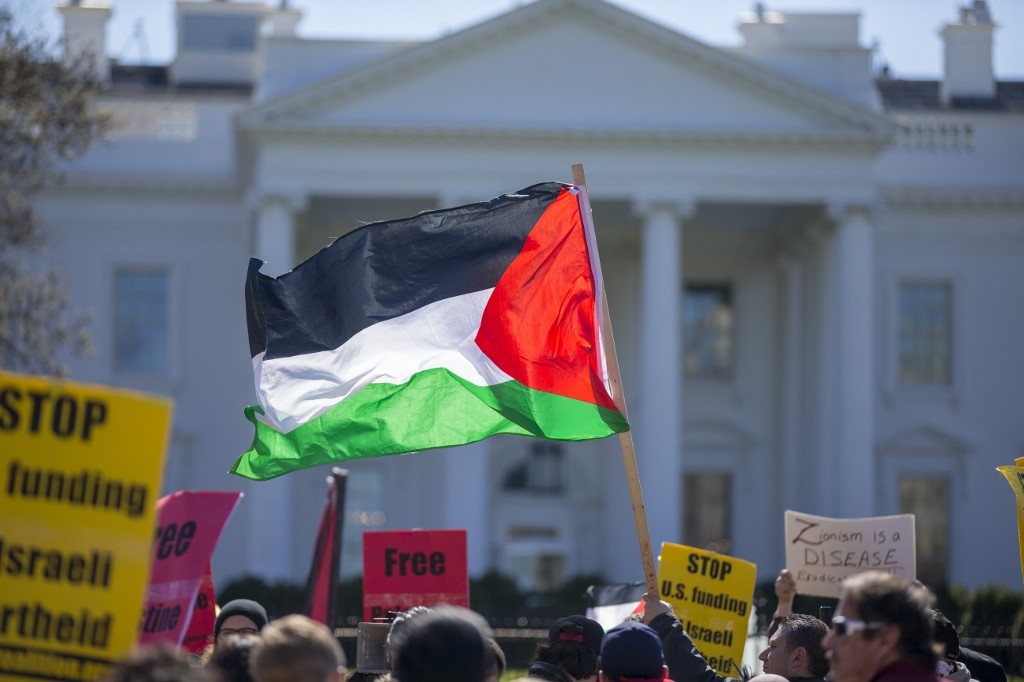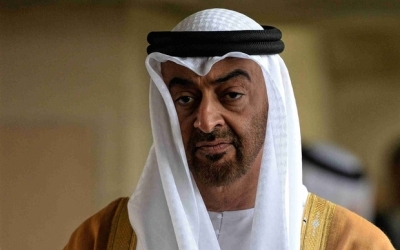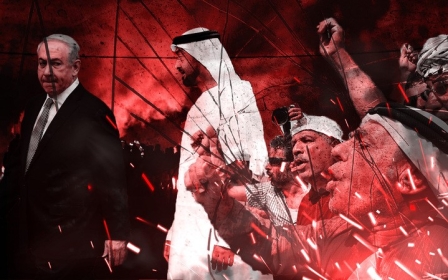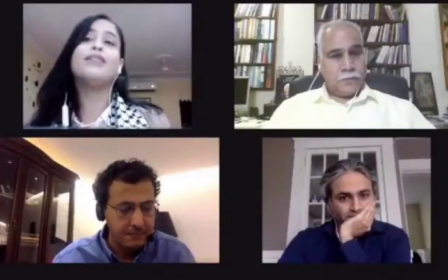UAE 'excusing and accepting' Israel's occupation, say Palestinian Americans

Disappointed but not surprised seems to be the general feeling among Palestinian Americans following the United Arab Emirates' announcement to normalise ties with Israel.
The UAE on Thursday revealed that it will formally normalise relations in exchange for Israel's promise to halt its plans to annex large swaths of the occupied West Bank.
UAE Minister of State for Foreign Affairs Anwar Gargash went so far as to call the deal a "death blow" to the annexation of Palestinian lands.
But Palestinian Americans were quick to object to the framing of the deal as tit-for-tat, pointing out that Abu Dhabi has been quietly warming ties with Israel for years.
'When you normalise relationships with Israel or any Zionist organisation - and normalisation means interaction without centering the Palestinian problem - then you are basically excusing and accepting everything that Israel has done to us for the past 72 years'
- Amer Zahr, President of New Generation for Palestine
"The fact that the UAE is championing that it was able to get Israel to sort of promise not to formally annex is really empty, and frankly shameful. They should know better, but they're doing this for their own benefit," said Amer Zahr, law professor and president of New Generation for Palestine.
The Palestinian-American community has also largely asserted that regardless of Israel's official position, it has for decades assumed de facto annexation over the West Bank through its occupation and continuous expansion of illegal settlements.
Zahr told Middle East Eye that the real danger in this formal normalisation is that "it legitimises everything that Israel has done to [Palestinians] for the past 72 years".
"It makes it seem like our dispossession, our exile and our disenfranchisement are things now to be accepted, and when this is done by Arab countries it's even more damaging. This is a victory for Israel. It's not a victory for Arabs or a victory for the United Arab Emirates. Israel is the only one that gains when it's able to use agreements like this as propaganda," Zahr said.
"Make no mistake, Israel will be the one to use this agreement to conduct more atrocities against Palestinians, not less," he added, rejecting any notion that frames the agreement as a step towards peace.
Noura Erakat, Palestinian-American human rights attorney and professor at Rutgers University, said she was mostly insulted by the UAE's assertion that its move had done anything to help the Palestinian people.
"Despite how unsurprising it is that the UAE normalized relations with Israel, it is as disappointing as ever to witness the failure of Arab nationalism and the endorsement/surrender to a colonial future," Erakat said on Twitter.
"The greatest insult is that the UAE frames this as way to 'stop' annexation and support Palestinians. Spare us this suffocating discourse," she continued.
'Merely making that friendship public'
Omar Baddar, former deputy director of the Arab American Institute (AAI), said that it was important to keep in mind that "there is nothing 'historic' or 'groundbreaking'" about Thursday's announcement in terms of what has actually been taking place between the two countries.
"Israel and the UAE have been strong allies under the table for many years," Baddar said in a series of posts. "This is merely making that friendship public."
Since 2015, Israel has had formal representation at the International Renewable Energy Agency based in Abu Dhabi, with Israeli officials visiting the Gulf state frequently.
Previously banned, in November the UAE announced that it planned to open up tourism to Israeli citizens.
Business ties have also been growing between the two countries. Last month, two Israeli defence behemoths signed a landmark agreement with an Emirati tech firm specialising in artificial intelligence, which was widely seen as a sign of growing ties between their countries. The deal was part of a growing partnership to tackle the novel coronavirus pandemic.
The Palestinian Authority has rejected the UAE's attempt to send humanitarian aid via Israel to the occupied West Bank, refusing in May and again in June to accept large shipments of coronavirus medical equipment and supplies from Abu Dhabi over their arrival in Tel Aviv as opposed to Jordan.
'Extremely unpopular in the region'
Tensions with Iran, a shared enemy, have also emboldened the relationship between the UAE and Israel, as the two countries hold a loose alliance with the United States and Saudi Arabia against the Islamic Republic.
Zahr said he would not be surprised if the UAE became just one of many Arab nations to formally normalise relations with Israel as a way to curry favour with the United States.
"While we hold a strong pride in our Arab culture and a strong bond with our Arab brothers and sisters on the ground that live in various Arab societies, we stopped looking to Arab governments for our salvation long ago… We'll be disappointed and frustrated and maybe even angry, but not surprised," Zahr said.
Baddar agreed, but pointed out that while Middle Eastern governments may be coming around to accepting Israel into the diplomatic fold, he did not believe that the hearts and minds of the populous in any given Arab country had been won over by Israel.
"The claim that the UAE deal is responsible for halting Israel's annexation announcement is merely a PR stunt for the UAE government, which knows full well that normalization with Israel WHILE Israel continues to brutalize Palestinians is extremely unpopular in the region," Baddar said.
"Israel may be able to normalize [with] these dictatorial governments [without] treating Palestinians like human beings who deserve basic rights, but Israel will never be truly accepted by the PEOPLE of the region so long as Palestinians live without freedom under the boot of occupation," he said.
'An opportunity to re-educate'
Yousef Munayyer, former executive director at the US Campaign for Palestinian Rights (USCPR), said that he thought the timing of the move was a political scheme to rally support for US President Donald Trump as a way to frame the president as a successful peacemaker.
"There is no doubt this Israel/UAE announcement was choreographed with Trump's election in mind," Munayyer said on Twitter, adding that he would not be surprised if other countries such as Bahrain and Saudi Arabia had similar announcements "already programmed for September and October".
"And, since Dem leadership is so old school in its political instincts it will find itself forced to congratulate Trump on his 'historic achievements'," Munayyer continued.
Zahr echoed Munayyer's sentiment, telling MEE that he fully expected the Democratic leadership to rally behind the announcement.
"Unfortunately, this move will be celebrated by all factions in American politics, not just Trump," Zahr said. "I wouldn't be surprised if the Biden ticket puts out something praising this move as well."
Zahr told MEE that the best thing the Palestinian-American community can do now is to use this as an opportunity to re-educate people on why anti-occupation activists are against normalisation, even in terms of smaller group organising.
"The reason that we don't want American organisations to sit down with Zionist organisations and sort of talk with them while ignoring the Palestinian problem, and thereby legitimising them, is the same reason we don't want Arab governments to create these sorts of agreements with Israel," Zahr said.
"When you normalise relationships with Israel or any Zionist organisation - and normalisation means interaction without centering the Palestinian problem - then you are basically excusing and accepting everything that Israel has done to us for the past 72 years, which means: the theft of our land; the exile of our people; five million refugees wandering around the world; millions of stateless people; the abrogation of rights for Palestinians that live in Gaza and the West Bank.
"It means you are accepting the status quo. That's why we are always against normalisation, so I think this is at least an opportunity to re-educate people on that and to be very clear that we are against this kind of thing, but again while we might be angry and frustrated, I don't think any Palestinian is surprised given the current political climate and make up of the Arab world".
Middle East Eye propose une couverture et une analyse indépendantes et incomparables du Moyen-Orient, de l’Afrique du Nord et d’autres régions du monde. Pour en savoir plus sur la reprise de ce contenu et les frais qui s’appliquent, veuillez remplir ce formulaire [en anglais]. Pour en savoir plus sur MEE, cliquez ici [en anglais].





